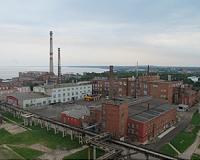 |
Hainichen (AFP) Dec 1, 2010 Surrounded by smoking vats in his tumble-down factory in former Communist East Germany, Wolfram Palitzsch sees a golden future in recycling "rare earths," the metals crucial to must-have gadgets such as mobile phones and TVs. The 44-year-old scientist is exploring ways of extracting the exotic metals that have spiked 300 percent in price over the past year alone, driven in part by trade tensions with China which enjoys a near monopoly on their export. "It's incredible that almost no one has thought of this before," Palitzsch told AFP, pacing eagerly around bubbling test-tubes. For the moment, his work is focused on recycling indium from solar panels. Not catagorised as one of the precious "rare earths," this metal is nonetheless needed to make flat-screen televisions and its price has soared. Using a technique he has patented, Palitzsch plunges the solar panels into a vat containing a special chemical solution, then collects the residue from which he extracts the valuable indium. But he is already turning his attention to the extraction of europium -- a rare earth used to produce the colour red in television screens -- from the glowing white powder found in energy-saving light bulbs. For years, he tried in vain to hawk the idea around German firms and eventually turned to Asia. "I was invited to talk about my discoveries in Tokyo and I got the impression that the topic was considered much more interesting in Japan than here at home. We Germans are sometimes too slow on the uptake," he said. Tech giant Japan suffered most when China reportedly halted rare earth shipments to its Asian rival in September following a territorial row. Beijing eventually restarted the flow and denied any embargo but the hiatus induced Tokyo to begin to look elsewhere for its supply, notably resource-rich Australia, which hopes to break Chinese production dominance. Experts have warned that global demand will outstrip supply next year, with China's own needs alone overtaking total global production by 2016. As for Palitzsch, he got the idea of recycling the precious commodities while working for a firm that produced water treatment products that was being hammered by a spike in aluminium prices in 2007 and 2008. He recalled how his father would scrupulously save the metallic caps on yoghurt pots and milk bottles and resell them. With the help of some old university friends, who worked in the solar panel business that flourished in the former East Germany, he hit on the idea of recycling the aluminium in solar cells. Palitzsch hopes soon to begin large-scale recycling of solar panels. "We have to start thinking about this now, not in 25 years when we need to rebuild or dismantle all the solar parks," he said. Despite the initial dearth of interest in Germany, the economy ministry has awarded a grant of 85,000 euros (113,000 dollars) to help Palitzsch and his boss, Ulrich Loser, to develop their ideas on an industrial scale. But while Palitzsch is bullish, experts are more cautious. Recycling rare earths "is very complex, I don't believe recycling them can be done on a large scale in the short term," said Volker Steinbach, a geologist at the German institute of raw materials. "If there is any potential, it will be in the medium- to long-term."
Share This Article With Planet Earth
Related Links Space Technology News - Applications and Research
 Estonia's rare earth break China's market grip
Estonia's rare earth break China's market gripTallinn (AFP) Dec 1, 2010 High-tech firms across the globe have been hit hard by China's slashing of rare earth metals exports but it is turning out to be good news for Estonia's small Silmet factory. "Unless China will change the quota, the prices of rare earth metals will at least double for next year," Silmet CEO David O'Brock told AFP. "We have never been able to keep up with demand. New inquiries are coming ... read more |
|
| The content herein, unless otherwise known to be public domain, are Copyright 1995-2010 - SpaceDaily. AFP and UPI Wire Stories are copyright Agence France-Presse and United Press International. ESA Portal Reports are copyright European Space Agency. All NASA sourced material is public domain. Additional copyrights may apply in whole or part to other bona fide parties. Advertising does not imply endorsement,agreement or approval of any opinions, statements or information provided by SpaceDaily on any Web page published or hosted by SpaceDaily. Privacy Statement |